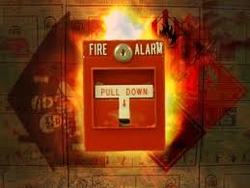 We so often think of pain as a problem, that we forget that it has a useful purpose, at least in acute situations. Pain is nature's warning signal that something is amiss. People who lose the ability to feel pain (as is the case with peripheral neuropathy in diabetes) can injure themselves without realizing it. These injuries can become infected, fester and lead to loss of limb. In his book Pain- the Gift Nobody Wants, the late Dr Paul Brand wrote of his experience in treating leprosy in India many years ago. He discovered that the serious deformities and loss of digits and limbs that leprosy sufferers experience are due to loss of sensation, leading to burns and other injuries going unnoticed. A few years ago our family was renting a quaint cottage in the Yorkshire Dales. It was a picturesque spot and we enjoyed it immensely. One drawback, however, was that the cottage's fire alarm was situated over the kitchen stove. It rang every time we did any cooking. Exasperated, I eventually unplugged its batteries. When we left, I forgot to plug them back in and it has been on my conscience ever since then, as I have wondered whether there has ever been a fire. Unlike acute pain which warns us of injury, chronic pain is pain which has outlived its usefulness, continuing to send its signals long after the injury which caused it has passed. Acute pain usually (though not always) has an identifiable physical cause. Pain does not always mean damage or harm. Chronic pain becomes a problem in its own right. Sometimes it is due to ongoing "peripheral sensitization" in the skin or soft tissues. Other times it is due to "central sensitization" in the brain, or both. This is why there are so many different possible approaches to chronic pain.
|
AuthorDavid is a fan of books and no doubt will be sharing some good reads here. Archives
February 2024
Categories
All
|
 RSS Feed
RSS Feed